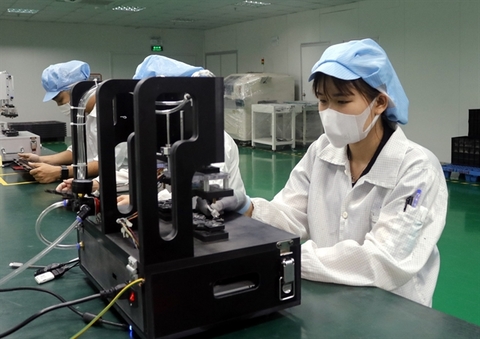
Production activities have resumed in an industrial zone in northern province of Bắc Giang. — VNS Photo
Typhoon Yagi left numerous businesses in Bắc Giang Province, especially those in industrial zones, struggling with its aftermath. Despite significant damage, all affected companies have swiftly resumed production, ensuring minimal disruption to their operations.
Ce Link Việt Nam Co Ltd, a producer of electronic components located in Vân Trung Industrial Park, Việt Yên Town, reported that despite early preventive measures, the typhoon caused substantial damage to the firm's facility. Damages included roof collapses and cracked warehouse walls, leading to wet and spoiled materials. Additionally, flooding in various parts of the province left many workers stranded, unable to commute to work.
Nguyễn Thị Thủy, a human resources officer at the company, reported that approximately 400 workers were unable to attend work due to flood-related disruptions, critically affecting production lines.
In response, the company is collaborating with external manpower agencies and actively recruiting to fill the labour gap. The company is also maintaining communication with absent workers to monitor their return timelines. Damaged materials have been relocated to dry storage and are currently being inventoried.
Hana Micron Vina, a South Korean-invested semiconductor manufacturer also based in Vân Trung Industrial Park, faced similar disruptions. Although the company experienced partial damage, it managed to resume production shortly after the storm.
Nguyễn Mạnh Chiến, head of the company’s Human Resources Department, said on the night of September 7, more than 400 employees were unable to work due to severe flooding in their areas, forcing the business to shut down all production lines that evening. Although many workers remained absent in the following days, the firm maintained operations to mitigate further losses.
Although Typhoon Yagi did not cause catastrophic damage to industry in Bắc Giang, it still left significant losses for local businesses.
Luxshare ICT Co Ltd, for example, suffered the partial collapse of its parking lot roof and warehouse canopies. Desay Battery Vina Co Ltd reported broken glass doors and damaged ceilings, while companies like Siflex Co Ltd, YADEA Việt Nam Co Ltd and Vietnam Sunergy JSC also experienced roof damage and other structural issues. Additionally, heavy rainfall resulted in localised flooding in Quang Châu and Vân Trung industrial parks, further complicating logistics.
A particularly pressing issue is the current workforce shortage in the province's industrial zones, with approximately 2,000 workers temporarily off-duty due to transportation difficulties or personal issues caused by the typhoon. Most of these workers are from mountainous northern provinces or from Sơn Động, Lục Ngạn and Lục Nam districts in Bắc Giang.
Luxshare ICT alone reported 300 absent workers, while New Wing Co Ltd had 200 workers off duty.

The local militia is reinforcing the Cống Bún Pumping Station in Bắc Giang City due to wall cracks caused by recent storms. This critical infrastructure affects the Thương River dike and nearby industrial zones, necessitating immediate repairs to prevent safety issues. — VNS Photo
Bắc Giang, an industrial hub in northern Việt Nam, is home to nine established industrial zones covering nearly 2,400 hectares. The province has 602 active foreign direct investment (FDI) projects from 30 countries and territories, with a total investment exceeding US$12.3 billion. These industrial zones employ approximately 222,000 workers.
According to representatives from the Bắc Giang Industrial Zones Management Board, thanks to proactive measures, safety and production have largely returned to normal. All industrial zones affected by the typhoon have resumed operations, with 100 per cent of companies back in production.
Although flooding has subsided, there are still concerns over water levels in drainage canals in Quang Châu and Vân Trung. To prevent future flooding, the Management Board has called for continued use of pumping stations, especially during heavy rainfall, to ensure the safety of industrial operations.
In addition, the Management Board is collaborating with the Department of Labour, Invalids and Social Affairs to assess employment and recruitment needs for the remainder of 2024, aiming to address labour shortages and support recruitment efforts in the months ahead. — VNS